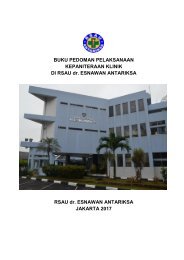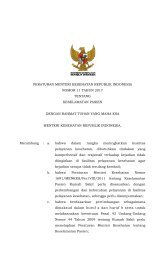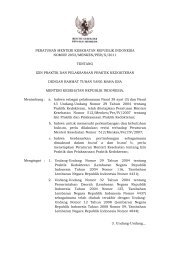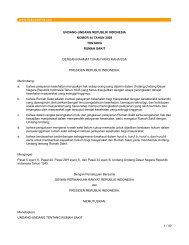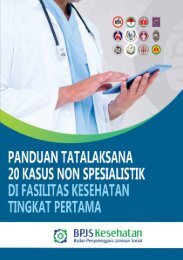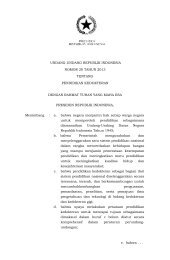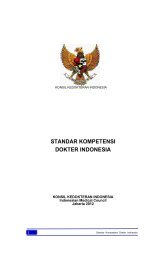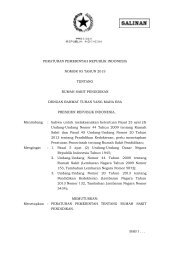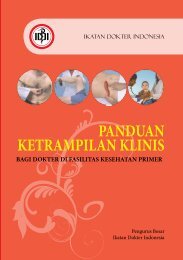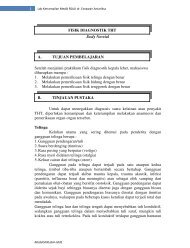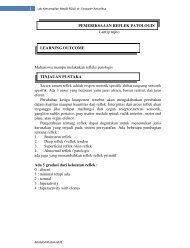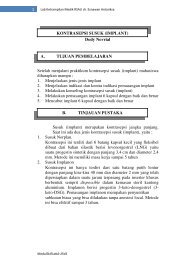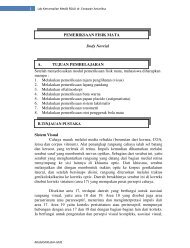Advanced Trauma Life Support ATLS Student Course Manual 2018
You also want an ePaper? Increase the reach of your titles
YUMPU automatically turns print PDFs into web optimized ePapers that Google loves.
xxxiv<br />
COURSE OVERVIEW<br />
a systematized approach to care, including the concept<br />
of transferring patients to more capable facilities as<br />
dictated by injury severity, and the importance of<br />
communication between providers at various levels<br />
of care. In many low- and middle-income countries,<br />
<strong>ATLS</strong> provides both the impetus to improve trauma<br />
care and the basic tools to begin to construct a system.<br />
The broad success of <strong>ATLS</strong>, and the building of a large<br />
population of providers who understand the principles<br />
and approach to injury care, both in the United States<br />
and internationally, continues to be instrumental in<br />
furthering the implementation of trauma systems.<br />
The wide dissemination of knowledge regarding injury<br />
care and the importance of making the correct early<br />
decisions has established a common set of principles<br />
and a common language that serve to initiate changes<br />
in trauma care and act as a cohesive force bringing<br />
the various components of a system together. This<br />
group of providers committed to the care of the trauma<br />
patient, the far-flung <strong>ATLS</strong> family, is ultimately the<br />
source of the overall vision and cohesion necessary to<br />
drive improvements in systems of trauma care. They<br />
bind the many separate elements of an inclusive system<br />
into a functioning whole.<br />
<strong>Course</strong> Development<br />
and DissemiNAtion<br />
The <strong>ATLS</strong> course was conducted nationally for the first<br />
time under the auspices of the American College of<br />
Surgeons in January 1980. International promulgation<br />
of the course began in 1980.<br />
The program has grown each year in the number of<br />
courses and participants. To date, the course has trained<br />
more than 1.5 million participants in more than 75,000<br />
courses around the world. Currently, an average of<br />
50,000 clinicians are trained each year in over 3,000<br />
courses. The greatest growth in recent years has been in<br />
the international community, and this group currently<br />
represents more than half of all <strong>ATLS</strong> activity.<br />
The text for the course is revised approximately every<br />
4 years to incorporate new methods of evaluation and<br />
treatment that have become accepted parts of the<br />
community of doctors who treat trauma patients.<br />
<strong>Course</strong> revisions incorporate suggestions from<br />
members of the Subcommittee on <strong>ATLS</strong>; members<br />
of the ACS COT; members of the international <strong>ATLS</strong><br />
family; representatives to the <strong>ATLS</strong> Subcommittee<br />
from the American College of Emergency Physicians<br />
and the American College of Anesthesiologists; and<br />
course instructors, coordinators, educators, and<br />
participants. Changes to the program reflect accepted,<br />
verified practice patterns, not unproven technology<br />
or experimental methods. The international nature of<br />
the program mandates that the course be adaptable to<br />
a variety of geographic, economic, social, and medical<br />
practice situations. To retain current status in the <strong>ATLS</strong><br />
Program, an individual must reverify training with the<br />
latest edition of the materials.<br />
In parallel with the <strong>ATLS</strong> course is the Prehospital<br />
<strong>Trauma</strong> <strong>Life</strong> <strong>Support</strong> (PHTLS) course, sponsored by the<br />
National Association of Emergency Medical Technicians<br />
(NAEMT). The PHTLS course, developed in cooperation<br />
with the ACS COT, is based on the concepts of the ACS<br />
<strong>ATLS</strong> Program and is conducted for emergency medical<br />
technicians, paramedics, and nurses who are providers<br />
of prehospital trauma care.<br />
Other courses have been developed with similar<br />
concepts and philosophies. For example, the Society<br />
of <strong>Trauma</strong> Nurses offers the <strong>Advanced</strong> <strong>Trauma</strong> Care for<br />
Nurses (ATCN), which is also developed in cooperation<br />
with the ACS COT. The ATCN and <strong>ATLS</strong> courses are<br />
conducted parallel to each other; the nurses audit the<br />
<strong>ATLS</strong> lectures and then participate in skill stations<br />
separate from the <strong>ATLS</strong> skill stations conducted for<br />
doctors. The benefits of having both prehospital and<br />
in-hospital trauma personnel speaking the same<br />
“language” are apparent.<br />
InteRNAtioNAl DissemiNAtion<br />
As a pilot project, the <strong>ATLS</strong> Program was exported<br />
outside of North America in 1986 to the Republic of<br />
Trinidad and Tobago. The ACS Board of Regents gave<br />
permission in 1987 for promulgation of the <strong>ATLS</strong><br />
Program in other countries. The <strong>ATLS</strong> Program may<br />
be requested by a recognized surgical organization or<br />
ACS Chapter in another country by corresponding with<br />
the <strong>ATLS</strong> Subcommittee Chairperson, care of the ACS<br />
<strong>ATLS</strong> Program Office, Chicago, Illinois. At the time of<br />
publication, the following 78 countries were actively<br />
providing the <strong>ATLS</strong> course to their trauma providers:<br />
1. Argentina (Asociación Argentina de Cirugía)<br />
2. Australia (Royal Australasian College of Surgeons)<br />
3. Bahrain (Kingdom of Saudi Arabia ACS Chapter<br />
and Committee on <strong>Trauma</strong>)<br />
4. Belize (College of Physicians and Surgeons of<br />
Costa Rica)<br />
5. Bolivia (AMDA Bolivia)<br />
6. Brazil (The Brazilian Committee on <strong>Trauma</strong>)<br />
7. Canada (ACS Chapters and Provincial<br />
Committees on <strong>Trauma</strong>)




